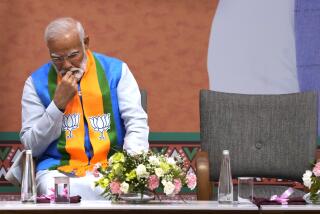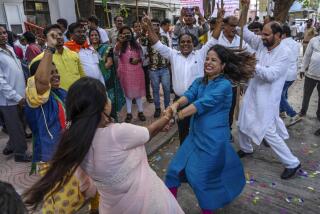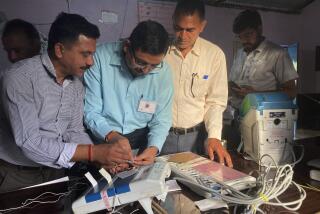India’s latest Gandhi has lots at stake in key state elections
- Share via
Reporting from Amethi, India — Priyanshi Srivastava, a second-year student at the Footwear Development Design Institute here in Amethi, was quite taken with lawmaker Rahul Gandhi during his recent visit to the institute that he helped start.
“I never expected he’d have such a deep knowledge about leather goods,” Srivastava said of the scion of India’s most famous political family.
“And I never thought he’d be so damned handsome.”
As campaigning for legislative assembly seats in the north-central state of Uttar Pradesh kicked off last week, Gandhi may hope other voters in India’s most populous state have the same reaction. This is no ordinary state and no ordinary contest for Gandhi, 41, the nation’s reputed prince-in-waiting whose father, grandmother and great-grandfather were all prime ministers.
Uttar Pradesh, which is expected to go to the polls in February, has a larger population at 200 million than Brazil’s. It also looms inordinately large in India’s political landscape: For four decades of the 64 years since India gained independence, the prime minister has hailed from the state.
Although Gandhi has held a national position with the ruling Congress Party in New Delhi since 2004 and is not facing any reelection test in the state polling, the spotlight is on him during this election to see how effective he is in boosting his party’s showing in Uttar Pradesh. His performance now is seen as having a large influence on his chances of becoming prime minister one day.
The state has changed since the days when the Gandhis and the Congress Party expected to control Uttar Pradesh as a matter of right. As regional parties gained strength by the late 1980s and caste politics intensified, Congress lost its four-decade grip on the state, and it has never regained it. The party now finds itself in a vicious fight with the state’s governing party, the Bahujan Samaj Party, led by the colorful Mayawati, who used her status as a dalit, a caste once known as “untouchables,” to great political effect.
But there’s more at stake than the leadership of one state. India’s real political power broker, Gandhi’s foreign-born mother, Sonia Gandhi, 64, is rumored to be seriously ill. That has placed more pressure on Rahul Gandhi to take more control of party strategy amid renewed questions about whether he has his ancestors’ political will and connection with voters.
His effectiveness ultimately rests on “the charisma that the family enjoys, not his personal ability so much,” said Ashis Nandy, a political psychologist with New Delhi’s Center for the Study of Developing Societies, a think tank. “But he’s been projected as a nice person, compassionate and caring.”
Gandhi, whose father, Rajiv, was prime minister in the 1980s before being assassinated in 1991 as he campaigned for a return to power, doesn’t lack name recognition. But he has ruffled feathers by traveling alone while promoting the party in the state, shunning the local party machinery when visiting constituencies.
Trying to put the best gloss on his unorthodox style, supporters say he wants to meet directly with people and is trying to modernize India’s multilayered political culture.
“In India, we’re rigid, formal,” said Ameeta Singh, a state lawmaker with the Congress Party who describes Gandhi as energetic and an avid runner with a good sense of humor. “I feel Rahul Gandhi is trying to move away from that.”
Critics counter that his approach risks undercutting political allies and could backfire as locals feel slighted by not being able to appear with their party’s rising star, denting their commitment to fight for him.
“Rajiv used to visit, work with party members, whereas Rahul tends to go it more alone,” said Ram Moorty Shukla, former general secretary of the Congress Party’s youth wing, sitting at his gas station surrounded by red and green containers of Servo oil. “Rahul Gandhi would benefit from the suggestions of older party workers.”
This approach could also leave him vulnerable, some analysts said. By shunning the usual coterie of trailing aides and putting his personal prestige on the line — he has pledged to lead a charge to greatly expand party seats from the 22 Congress now controls in the 402-seat state assembly — analysts say a drubbing could be pinned on him personally, given a dearth of counselors to absorb the blame.
Party insiders also cite a lack of strategy, organizational structure or the high-quality candidates needed to aggressively counter the Bahujan Samaj Party in Uttar Pradesh.
For many here and across India, Gandhi’s younger sister, Priyanka, 39, would be at least as good a candidate, but she has not stood for election, preferring to campaign for her mother and brother.
“He doesn’t have his sister’s immediate natural charisma,” said Manini Chatterjee, political editor of the Telegraph newspaper. “She’s a natural, instinctive politician. But he’s trying to make up for it with a lot of hard work and sincerity.”
Gandhi, in close concert with his mother, has tried to paint Mayawati as someone who has lost touch with the underprivileged by himself eating with dalits, sleeping in their houses and raising their concerns nationally.
“I don’t know why he came to stay with me,” said Shiv Kumari, 30, a widow with five children who lives in the state’s Semra Village. “We don’t feel like we’re getting any benefit from his coming. But I still believe in Rahul Gandhi, and believe one day he’ll help us.”
Gandhi has also accused Mayawati’s state government of being corrupt, wasteful and mismanaged, to the point that residents are leaving for jobs elsewhere.
But wily street fighter Mayawati, dubbed a “dalit goddess” by her followers, has quickly counterattacked, offering a popular if unlikely plan to divide the state into four parts and calling Gandhi’s comments “insulting” to hard-working migrants hoping to improve their lives.
For India’s nationally ruling Congress Party, a big gain in Uttar Pradesh could help reverse its fortunes amid a wave of corruption scandals, nationwide protests led by anti-corruption hunger striker Anna Hazare and the faltering leadership of Prime Minister Manmohan Singh, 79.
That said, expectations may be so low in Uttar Pradesh — or India —- for the Congress-led government, some said, that even a decent showing will help Gandhi’s star rise in the party and across the nation.
“If they do well, it would be a big boost” to the Congress Party nationally, Chatterjee said. “But if not, it’s just more bad news on top of all the other bad news out there already.”
Tanvi Sharma of The Times’ New Delhi bureau contributed to this report.
More to Read
Sign up for Essential California
The most important California stories and recommendations in your inbox every morning.
You may occasionally receive promotional content from the Los Angeles Times.












